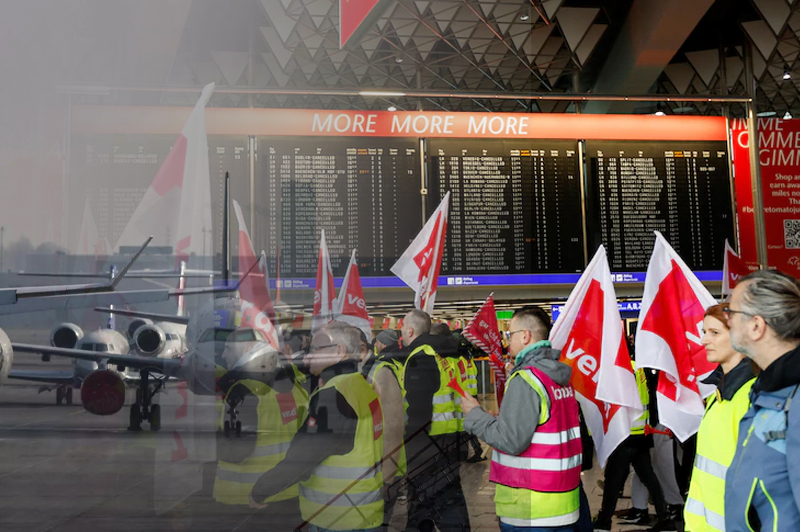

german airports strike grounds almost 300,000 passengers
Hundreds of thousands of frustrated travelers have been left stranded at German airports as a result of an ongoing strike by airport personnel. More than 3,000 workers are on strike for higher wages and better working conditions, resulting in the cancellation or delay of nearly 300,000 flights between December 22 and 24. The strike has been especially hard on travelers from countries such as India and China who have to return home for Christmas. Airports across Germany are feeling the strain, with Frankfurt Airport’s Terminal 1 being the worst affected due to its high passenger load. The effects of the strike may extend past Christmas if negotiations fail to reach an agreement soon, leaving many more passengers in limbo until a resolution is reached. In this article, we’ll explore what led to the strike and how it can be avoided in the future.
As of early Monday morning, German airline Lufthansa has cancelled nearly 1,000 flights due to a pilots’ strike. The strike began at midnight Sunday and is expected to last until 11:59 p.m. on Tuesday. The dispute is over pay and working conditions.
Lufthansa has offered the pilots a 6.4% pay raise spread out over three years, but the pilots are demanding a retroactive pay increase for the past five years totaling around 34%. In addition, the pilots are seeking changes to the early retirement agreement and more transparency regarding flight schedules.
The airline has said that it will try to minimize the impact of the strike by using reserve pilots and re-booking passengers onto other airlines where possible. However, with such short notice, many passengers are likely to be stranded or face significant delays.
More than 350 flights were cancelled in Germany on Thursday as a public sector strike prompted the cancellation of short-haul services across the country.
Around 700,000 passengers were affected by the strike, which was called by the Verdi union in a dispute over pay and conditions.
The union represents around 2.3 million workers in the public sector, including airport staff, air traffic controllers and ground crew.
The strike is the latest in a series of industrial action by Verdi that has hit German airports in recent years. In 2016, a four-day strike by security staff led to the cancellation of around 4,000 flights and affected around 800,000 passengers.
A four-day strike by ground staff at German airports has left nearly 400,000 passengers stranded. The dispute, over a pay dispute between the Verdi union and airport operator Fraport, has affected airports across the country including Frankfurt, Munich and Hamburg.
The strike began on Wednesday morning and is set to continue until Sunday night. Over the course of the strike, an estimated 3,800 flights have been cancelled.
While the majority of those affected are German citizens, the disruption has also been felt by travellers from around the world. Many passengers have been forced to change their plans or even cancel their trips altogether.
The impact of the strike has been felt most keenly at Frankfurt Airport, Germany’s busiest airport. On Thursday alone, over 1,200 flights were cancelled due to the industrial action.
The strike is likely to cause further disruption in the days to come as more travellers attempt to leave Germany before the end of the summer holidays.
As a result of the ongoing strike by security personnel at German airports, Lufthansa has announced that it will offer passengers compensation for any resulting flight disruptions.
According to the airline, customers whose flights are cancelled or delayed by more than two hours will be eligible for a refund or a voucher for future travel. In addition, Lufthansa will provide hotel accommodation and meals for passengers whose flights are significantly delayed.
The strike, which began on Wednesday morning, is expected to continue throughout the day and into Thursday. It has already resulted in the cancellation of hundreds of flights, and has caused significant disruption for passengers at airports across Germany.
No one knows when the strike will end. The airport workers are demanding a pay raise, and the employers have so far refused to meet their demands. The workers are not expected to back down anytime soon, which means that the strike could go on for weeks or even months. This is a major inconvenience for passengers, who are advised to check the status of their flights before heading to the airport.
The strike at German airports is a major inconvenience for travelers that have been affected by the grounding of nearly 300,000 passengers. This situation clearly illustrates how important it is for airports to have reliable and efficient labor relations systems in place. It also shows us just how much damage can be done when labor disputes arise and are not handled properly. As we all work together to ensure that such situations do not happen again, let us hope for a swift resolution so that everyone can get back to their travels safely and quickly.
Read More:- Kudos To This Indore-Based IT Firm That Supports Work-Life Balance
Novo Energy, the battery manufacturing initiative co-founded by Volvo Cars and Northvolt, announced that it would cut 50% of its…
The Trump administration announced a national review targeting approximately 450,000 migrant children who crossed the US-Mexico border without their parents,…
In a new effort to speed up deportation processes, the Trump administration is unveiling an unpopular application, which gives undocumented…
In a bid to advance inclusive hiring and access a larger talent pool, Deloitte has opened up multiple roles for…
At the 2025 Great Place To Work Summit in Las Vegas, Marriott's CEO Anthony Capuano showed a powerful moment that…
A new report from Save the Children and Plan International, provides an alarming description of the experiences migrant children have…
This website uses cookies.
Read More